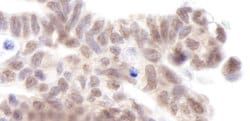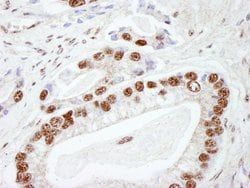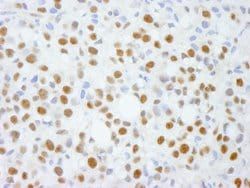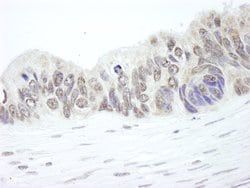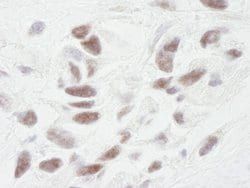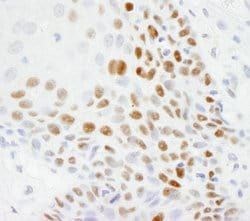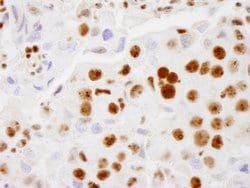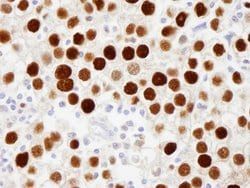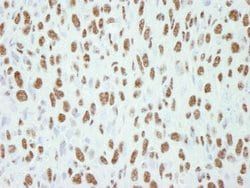7143957
p53 Polyclonal Antibody, Bethyl Laboratories
Rabbit Polyclonal Antibody
Manufacturer: Fischer Scientific
The price for this product is unavailable. Please request a quote
Antigen
p53
Classification
Polyclonal
Form
Liquid
Regulatory Status
RUO
Formulation
TBS with 0.1% BSA and 0.09% sodium azide
Gene Alias
antigen NY-CO-13, cellular tumor antigen p53, p53 tumor suppressor, phosphoprotein p53, transformation-related protein 53, TP53
Gene Symbols
TP53
Isotype
IgG
Purification Method
Antigen affinity chromatography
Product Type
Antibody
Applications
Immunohistochemistry
Conjugate
Unconjugated
Host Species
Rabbit
Target Species
Human
Gene Accession No.
P04637
Gene ID (Entrez)
7157
Immunogen
Between 50 and 100
Primary or Secondary
Primary
Content And Storage
4° C
Gene
TP53
Description
- The recommended shelf life for this product is 1 year from date of receipt
- Based on 100% sequence identity, this antibody is predicted to react with Gorilla, Chimpanzee and Common tree shrew The tumor suppressor protein, p53, is a sequence specific transcription factor that is activated by cellular stress
- p53 mediates cell cycle arrest or apoptosis in response to DNA damage or starvation for pyrimidine nucleotides
- p53 is up-regulated in response to stress signals and stimulated to activate transcription of specific genes, resulting in expression of p21waf1 and other proteins involved in G1 or G2/M arrest
- The structure of p53 comprises an N-terminal transactivation domain, a central DNA-binding domain, an oligomerisation domain, and a C-terminal regulatory domain
- There are various phosphorylation sites on p53, of which the phosphorylation at Ser15 is important for p53 activation and stabilization
- p53 has been characterized to play a role in blocking the proliferative action of damaged cells and act as an anticancer agent
- Phosphorylation of Ser392 in p53 has been shown to associate with the formation of human tumors
- In addition, p53 has also been linked to the effects of aging and oxidative stress and an increase in p53 has been linked to deficits in LTP (Long Term Potentiation) in learning and memory
- p53 is found in very low levels in normal cells, however, in a variety of transformed cell lines, it is expressed in high amounts, and believed to contribute to transformation and maligcy
- Mutants of p53 that frequently occur in a number of different human cancers fail to bind the consensus DNA binding site, and cause the loss of tumor suppressor activity
- Alterations of the TP53 gene occur not only as somatic mutations in human maligcies, but also as germline mutations in some cancer-prone families such as Li-Fraumeni syndrome.
Compare Similar Items
Show Difference
Antigen: p53
Classification: Polyclonal
Form: Liquid
Regulatory Status: RUO
Formulation: TBS with 0.1% BSA and 0.09% sodium azide
Gene Alias: antigen NY-CO-13, cellular tumor antigen p53, p53 tumor suppressor, phosphoprotein p53, transformation-related protein 53, TP53
Gene Symbols: TP53
Isotype: IgG
Purification Method: Antigen affinity chromatography
Product Type: Antibody
Applications: Immunohistochemistry
Conjugate: Unconjugated
Host Species: Rabbit
Target Species: Human
Gene Accession No.: P04637
Gene ID (Entrez): 7157
Immunogen: Between 50 and 100
Primary or Secondary: Primary
Content And Storage: 4° C
Gene: TP53
Antigen:
p53
Classification:
Polyclonal
Form:
Liquid
Regulatory Status:
RUO
Formulation:
TBS with 0.1% BSA and 0.09% sodium azide
Gene Alias:
antigen NY-CO-13, cellular tumor antigen p53, p53 tumor suppressor, phosphoprotein p53, transformation-related protein 53, TP53
Gene Symbols:
TP53
Isotype:
IgG
Purification Method:
Antigen affinity chromatography
Product Type:
Antibody
Applications:
Immunohistochemistry
Conjugate:
Unconjugated
Host Species:
Rabbit
Target Species:
Human
Gene Accession No.:
P04637
Gene ID (Entrez):
7157
Immunogen:
Between 50 and 100
Primary or Secondary:
Primary
Content And Storage:
4° C
Gene:
TP53
Antigen: PELP1/MNAR
Classification: Polyclonal
Form: Liquid
Regulatory Status: RUO
Formulation: TBS with 0.1% BSA and 0.09% sodium azide
Gene Alias: HMX3, MNAR, P160, modulator of non-genomic activity of estrogen receptor; modulator of nongenomic activity of estrogen receptor; proline and glutamic acid rich nuclear protein; proline, glutamic acid and leucine rich protein 1; proline-, glutamic acid- and leucine-rich protein 1; proline-, glutamic acid-, leucine-rich protein 1; transcription factor HMX3
Gene Symbols: __
Isotype: IgG
Purification Method: Antigen affinity chromatography
Product Type: Antibody
Applications: Immunohistochemistry
Conjugate: Unconjugated
Host Species: Rabbit
Target Species: Human, Mouse
Gene Accession No.: Q8IZL8, Q9DBD5
Gene ID (Entrez): 27043, 75273
Immunogen: Between 1000 and 1050
Primary or Secondary: Primary
Content And Storage: 4° C
Gene: PELP1
Antigen:
PELP1/MNAR
Classification:
Polyclonal
Form:
Liquid
Regulatory Status:
RUO
Formulation:
TBS with 0.1% BSA and 0.09% sodium azide
Gene Alias:
HMX3, MNAR, P160, modulator of non-genomic activity of estrogen receptor; modulator of nongenomic activity of estrogen receptor; proline and glutamic acid rich nuclear protein; proline, glutamic acid and leucine rich protein 1; proline-, glutamic acid- and leucine-rich protein 1; proline-, glutamic acid-, leucine-rich protein 1; transcription factor HMX3
Gene Symbols:
__
Isotype:
IgG
Purification Method:
Antigen affinity chromatography
Product Type:
Antibody
Applications:
Immunohistochemistry
Conjugate:
Unconjugated
Host Species:
Rabbit
Target Species:
Human, Mouse
Gene Accession No.:
Q8IZL8, Q9DBD5
Gene ID (Entrez):
27043, 75273
Immunogen:
Between 1000 and 1050
Primary or Secondary:
Primary
Content And Storage:
4° C
Gene:
PELP1
Antigen: Phospho-MCM2 (Ser108)
Classification: Polyclonal
Form: Liquid
Regulatory Status: RUO
Formulation: TBS with 0.1% BSA and 0.09% sodium azide
Gene Alias: minichromosome maintece complex component 2
Gene Symbols: __
Isotype: IgG
Purification Method: Antigen affinity chromatography
Product Type: Antibody
Applications: Immunofluorescence, Immunohistochemistry
Conjugate: Unconjugated
Host Species: Rabbit
Target Species: Human, Mouse
Gene Accession No.: P49736, P97310
Gene ID (Entrez): 17216, 4171
Immunogen: Surrounding serine 108
Primary or Secondary: Primary
Content And Storage: 4° C
Gene: MCM2
Antigen:
Phospho-MCM2 (Ser108)
Classification:
Polyclonal
Form:
Liquid
Regulatory Status:
RUO
Formulation:
TBS with 0.1% BSA and 0.09% sodium azide
Gene Alias:
minichromosome maintece complex component 2
Gene Symbols:
__
Isotype:
IgG
Purification Method:
Antigen affinity chromatography
Product Type:
Antibody
Applications:
Immunofluorescence, Immunohistochemistry
Conjugate:
Unconjugated
Host Species:
Rabbit
Target Species:
Human, Mouse
Gene Accession No.:
P49736, P97310
Gene ID (Entrez):
17216, 4171
Immunogen:
Surrounding serine 108
Primary or Secondary:
Primary
Content And Storage:
4° C
Gene:
MCM2
Antigen: CA150
Classification: Polyclonal
Form: Liquid
Regulatory Status: RUO
Formulation: TBS with 0.1% BSA and 0.09% sodium azide
Gene Alias: Transcription elongation regulator 1, CA150, MGC133200, TAF2S, Urn1
Gene Symbols: __
Isotype: IgG
Purification Method: Antigen affinity chromatography
Product Type: Antibody
Applications: Immunohistochemistry
Conjugate: Unconjugated
Host Species: Rabbit
Target Species: Human, Mouse
Gene Accession No.: O14776, Q8CGF7
Gene ID (Entrez): 10915, 56070
Immunogen: Between 15 and 50
Primary or Secondary: Primary
Content And Storage: 4° C
Gene: TCERG1
Antigen:
CA150
Classification:
Polyclonal
Form:
Liquid
Regulatory Status:
RUO
Formulation:
TBS with 0.1% BSA and 0.09% sodium azide
Gene Alias:
Transcription elongation regulator 1, CA150, MGC133200, TAF2S, Urn1
Gene Symbols:
__
Isotype:
IgG
Purification Method:
Antigen affinity chromatography
Product Type:
Antibody
Applications:
Immunohistochemistry
Conjugate:
Unconjugated
Host Species:
Rabbit
Target Species:
Human, Mouse
Gene Accession No.:
O14776, Q8CGF7
Gene ID (Entrez):
10915, 56070
Immunogen:
Between 15 and 50
Primary or Secondary:
Primary
Content And Storage:
4° C
Gene:
TCERG1
